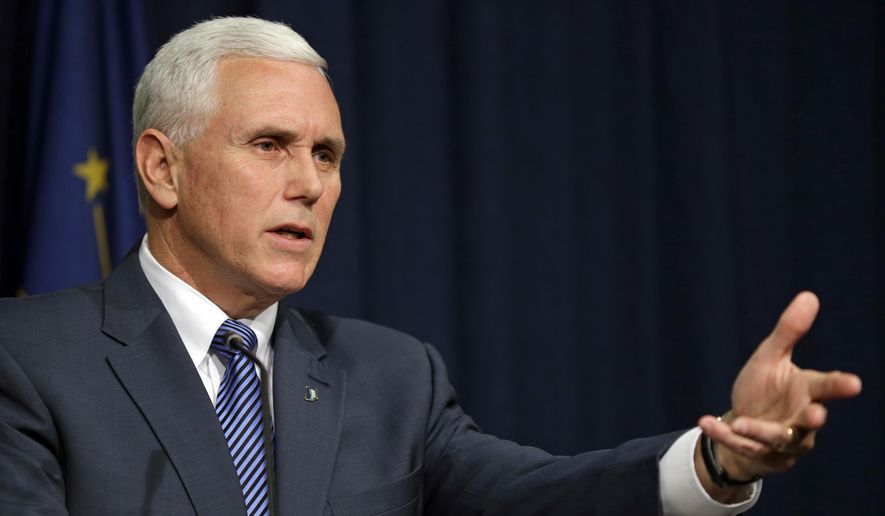Indiana is being threatened with an economic boycott after Gov. Mike Pence signed the Religious Freedom Restoration Act Thursday, even though 19 other states and the federal government have already passed similar laws.
Gay-rights groups are drumming up support for a boycott over the law, arguing that it allows religion to be used to justify discrimination, although none of the other states has faced a similar backlash.
For example, NCAA President Mark Emmert said in a statement he was “especially concerned” about how the legislation, known as RFRA, would affect student athletes and employees at next week’s Men’s Final Four basketball tournament at Lucas Oil Stadium in Indianapolis.
He said nothing about the Women’s Final Four, which begins April 5 at the Amalie Arena in Tampa, Florida. As it turns out, Florida enacted a RFRA in 1998, according to the National Conference of State Legislatures.
Salesforce.com CEO and founder Marc Benioff said his San Francisco-based company was cancelling “all programs that require our customers/employees to travel to Indiana to face discrimination.” He didn’t say whether the same would apply to Tennessee, home to his client MissionPoint Health Partners, although Tennessee has had a RFRA on the books since 2009.
Then there’s former Secretary of State Hillary Clinton, who said on Twitter that she was “sad this new Indiana law can happen in America today.” Her husband, President Clinton, signed the federal RFRA in 1993.
“The level of hyperbole by otherwise very smart people on these bills is just amazing,” said Quena D. Gonzalez, director of state and local affairs for the Family Research Council, which supports the RFRA.
“You’d expect Joe Biden to say something amusing, but did Hillary Clinton really tweet that she’s ’sad’ that Indiana enacted a law her husband signed in the Rose Garden in 1993?” he said in an email.
Not all RFRA bills are identical, but they share the goal of prohibiting laws that place a “substantial burden” on an individual’s free exercise of religion, barring a “compelling government interest.” In those cases, the government must use “the least restrictive means.”
Another 11 states have RFRA-like protections stemming from state court decisions.
But things have changed since 1993, including the political landscape. The 2009 Affordable Care Act’s birth-control mandate has prompted a string of lawsuits from the owners of companies such as Hobby Lobby, who say providing certain contraceptives that act as abortifacients violates their religious beliefs.
Mr. Pence cited the ACA mandate in his signing statement. “Last year the Supreme Court of the United States upheld religious liberty in the Hobby Lobby case based on the federal Religious Freedom Restoration Act, but that act does not apply to individual states or local government action,” the Republican governor said.
Another host of issues has arisen with the widespread legalization of same-sex marriage. A number of Christian photographers, bakers and florists are fighting lawsuits over their refusal to provide services for gay weddings on religious grounds.
Those advocating for RFRA in Indiana said the law would offer needed First Amendment protections for such business owners, while the National LGBTQ Task Force argued that the Indiana bill “abuses religion as a cynical excuse to legalize open discrimination against LGBTQ people.”
As Christian photographer Elaine Huguenin can attest, however, such laws offer no guarantees. New Mexico passed a RFRA in 2000, but the New Mexico Supreme Court ruled against Ms. Huguenin in 2013 after she was sued by a gay couple, saying the RFRA only applies to cases in which the government is a party.
Critics point out that the Indiana RFRA is broader than other state and federal laws, most significantly because it applies “regardless of whether the state or any other governmental entity is a party to the proceeding.”
At the same time, some courts have interpreted the federal RFRA to apply to lawsuits between individuals, as South Texas College of Law assistant professor Josh Blackman noted on his website.
Mr. Blackman cited an April 2013 article in the Virginia Law Review by Shruti Chaganti, who said, “The circuits are split as to whether RFRA can be claimed as a defense in citizen suits — suits solely between private citizens in which the government is not a party.”
At least two other states, Arkansas and Georgia, are considering similar bills this year. Arizona Gov. Jan Brewer vetoed such a bill last year under threats of a state boycott, although Arizona had enacted a RFRA in 2012.
“We hope leaders in those states are paying attention to the public outcry in their states and seeing the economic backlash in Indiana and elsewhere,” Eunice Rho, ACLU advocacy and policy counsel, said in a statement.
The NCAA’s Emmert said organizers of the Men’s Final Four would “work diligently to assure student-athletes competing in, and visitors attending, next week’s Men’s Final Four in Indianapolis are not impacted negatively by this bill.”
“Moving forward, we intend to closely examine the implications of this bill and how it might affect future events as well as our workforce,” Mr. Emmert said.
Mr. Pence, who signed the bill in a private ceremony with lawmakers and Jewish, Hindu and Christian religious leaders, has repeatedly denied that the Indiana RFRA will allow discrimination, saying, “[I]f I thought it legalized discrimination in any way in Indiana, I would have vetoed it.”
“In fact, it does not even apply to disputes between private parties unless government action is involved,” he said. “For more than 20 years, the federal Religious Freedom Restoration Act has never undermined our nation’s anti-discrimination laws, and it will not in Indiana.”
• Valerie Richardson can be reached at vrichardson@washingtontimes.com.




Please read our comment policy before commenting.